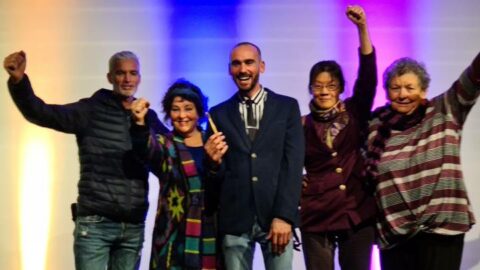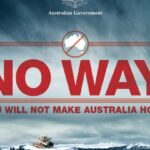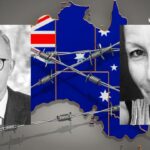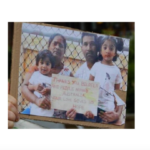“This Litany of Horrors Degrades Our Whole Nation”: PJLU’s Fabia Claridge on Refugee Policy
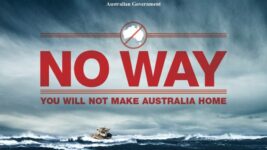
Newly minted PM Anthony Albanese was part of a 2015 attempt to ensure that a future Labor government would reverse the Operation Sovereign Borders policy of turning back asylum seeker and refugee boats.
Albanese’s first act in office, however, was to facilitate the turning back of such a boat to Sri Lanka.
Indeed, thanks to the outgoing Morrison government having breached protocol to announce that the boat had arrived in local waters on election day, we now know that Albanese has turned back three boats in total.
Seven years ago in opposition, the new prime minister said “if people were in a boat, including families and children, I myself couldn’t turn that around. I couldn’t ask someone to do something that I couldn’t see myself doing.”
Yet, his government is asking Australian personnel to undertake this procedure right now, and as Albanese’s 2015 comments indicate, it’s not just the families in these boats risking their lives who are being traumatised, it’s the local actors carrying out the turnbacks as well.
Saying one thing…
On a diplomatic trip to New Zealand a fortnight ago, new foreign affairs minister Penny Wong confirmed that the incoming Labor government plans to keep detaining people on the remote island of Nauru. This is despite the large numbers once detained their having dwindled to a little over 100.
Numerous reports, including the Nauru Files, testify to the Australian facility housing refugees and asylum seekers on the island being rife with human rights abuses.
Just last year the attempted murder of a Tamil refugee detained on Nauru by our country was perpetrated by locals who ran him down with a car.
The decision to keep Nauru open doesn’t reflect the sentiment set out in the 2021 ALP National Platform, as it underscores that seeking asylum is a right contained in the 1951 Refugee Convention that the party suggests it adheres to.
“Labor will continue to show global leadership and increase Australia’s humanitarian refugee intake and we will treat people seeking our protection with dignity and compassion in accordance with our international obligations, the rule of law and the principles of fairness,” it dubiously reads.
Cuts both ways
People Just Like Us is a refugee and asylum seeker advocacy group that has been campaigning for a shift in the government approach to dealing with some of Earth’s most desperate and vulnerable people when they arrive in Australian waters looking for help.
The refugee rights organisation stresses that the turning back of the boats and mandatory detention policies are not only destroying the lives of those who come here seeking refuge, but these actions carried out in the name of all Australians are also traumatising the nation.
Sydney Criminal Lawyers spoke to People Just Like Us spokesperson Fabia Claridge about Albanese’s decision to carry on with the punishment of refugees, the viable alternatives that exist to these policies, and the 13,000 asylum seekers in Indonesia that the government has paid to detain there.
Firstly, thanks to former PM Scott Morrison it was highlighted that as the Albanese government was coming to power, its first act in office was to facilitate the turning back of a refugee boat to Sri Lanka.
Since the election, three refugee boats from that country have been turned back, which is a practice Anthony Albanese voted against in 2015.
Fabia, what are your thoughts on these highly visible turnbacks commencing as the nation was still at the ballot? And how should the incoming Labor government be acting on this?
We all knew that the Morrison government was going to try it on. But we want to say that asylum seeker boats have never stopped during the LNP regime.
It’s only now that the arrivals are being publicised, and we saw that when people who were in marginal electorates got text messages about the boat from Sri Lanka on election day.
So, we know that it was a blatant political ploy to publicise these boat arrivals.
We don’t really like to talk about boats. We prefer to talk about other things. Solutions not problems, as Albo would say.
Talking about boats was a Liberal party attempt to play into the old fear trope and signalling to racist voters. Fortunately, it failed.
The new government has a mandate for change. We want to see them use this mandate. But we’re a little disappointed so far, as they did turn those boats around. I guess it’s early days.
Unfortunately, they’ve signalled bad news by keeping Pezzullo on as the head of the Department of Home Affairs. He presided over a lot of cruel and vicious policies and actions.
Pezzullo is very close to Dutton, so we have to question why they have done this, and what is the scope for change in the future.
There are questions about the legality of the turnbacks, and questions about the lack of transparency that has gone on under the LNP regime, as well as their administration and their financial accountability.
A recent audit of Home Affairs was scathing about the financing of the on-water matters, and it found that people trafficking operations had spent $17 million without any supporting invoices.
So, we ask will ICAC investigate this?
Furthermore, there are stories time and again about trauma done to navy and other personnel who are expected to implement the boat turnbacks.
We have to ask why we the public are allowing boat turnbacks to continue. Is it humane?
If you’re unsure, and you don’t know whether it’s humane because you can’t see it, I suggest asking further, because would Australians be comfortable with such measures being taken on our own people, such as flood victims. How would we feel then?
Australians need to figure it out and take a strong stand as a whole.
You’re talking about the Australians whose job it is to turn back the boats being traumatised because they’re turning families and children away.
Not enough is said about the trauma which is being done not to refugees and asylum seekers but that which is being done to our country as a whole: to our citizens, the people who are asked to this dirty work and also the many thousands of grandmas, rural people and people who visit detention centres.
We’ve been traumatised by this being done in our name. We’ve been traumatised by our friends committing suicide and our families being ripped apart. I’ve seen this myself.
One example is a Sri Lankan mother collapsing on the street with her newborn child as her husband was driven off in a white van to be returned to Sri Lanka. I could go on and on.
Albanese’s statements about being against the turnbacks in 2015, actually seem to express the predicament these people who are being traumatised by having to carry out the turnbacks are going through. He said it was something he couldn’t do himself.
But his government has now done it. I wonder to what extent the security establishment is getting at politicians. I understand that the Labor party might be concerned about being wedged, but they’ve got a mandate. They have a majority. They have a lot of support.
Now is the time to act. This is why we’re feeling frustrated. We feel there is another narrative to put forward.
“Stop the boats” is a catchy phrase. It plays into a whole historical xenophobic history of white Australia narrative – the Yellow Peril, the Red Devils.
Stop the boats sounds easier than other phrases like solutions like “stop selling weapons to abusive regimes”. Like “offer safe pathways”: this is an obvious solution. No one would risk their own precious life on a boat if they were given other options.
Like: “implement generous aid programs”, “engage with the region”, “put pressure on governments that persecute minorities”, “don’t sell weapons to them”, “implement orderly departure programs”, “organise rostered safe travel options”, “negotiate a regional solution”.
None of those are as catchy as the phrase stop the boats, but they’re actually what Australia needs to do going forward, and it can be done quite quickly.
Look at Senator Wong and her nimble diplomatic actions in the Pacific. Three thousand work visas with pathways to settlement, just like that. It’s easy when you want to, isn’t it?
You mention Senator Wong. Whilst on a recent trip to New Zealand, she confirmed that the Albanese government will be maintaining immigration detention in Nauru. Yet, there are only 120-odd detainees left on the island at present.
Why would the incoming government choose to continue with this expensive facility, which is notorious for its human rights abuses?
Why would they indeed choose to keep Nauru open with all that’s happened there?
Who in the Labor party has read the Nauru Files? The suicides, the self-immolations, self-harm, child sexual abuse, deliberate medical neglect.
We are so tired of meeting this litany of horrors that degrades our whole nation.
Even now with Nauru still open, just the other day a report came out outlining it costs $11,000 per person per day. It costs more than $4 million per person per year of our tax money.
But there are reports that food is currently running out, so where is the money going? Do Australians care? Do they care about the abuse? Do they care about the money?
It’s time to look at the heavy price financially, morally and emotionally that we pay for our fear and racism. It’s cheaper and better to dump it.
So, we ask is ICAC also going to look into where the money’s gone for offshore detention?
Again, we say why are they keeping Mike Pezzullo in place as head of the Department of Home Affairs. He has close links to Dutton and Morrison, and he’s presided over many dastardly actions towards people who ask Australia for safety.
Just recently, it’s come out about these non-transparent actions, as I’ve said before, with $17 million unaccounted for, with no receipts. What’s going on?
Keeping Nauru open makes us ask what does it mean when Albo says, “Australians have voted for change”, and “we want solutions not arguments”.
Priya Nadesalingam has just come out and said that detention is not a good place for any human being.
Also, we need to ask when will Labor acknowledge the seats it has won on Greens and other preferences and the composition of the Senate.
We hope Labor has the confidence and the gumption to change the rigid and detrimental policy of detention itself both onshore and offshore and the boat turnbacks.
Sadly, we feel they’re missing the opportunity of the honeymoon period.
The government’s policy platform heading into the election includes ending temporary protection visas. Although, commentators have been wary as to whether this change will happen.
About 19,000 asylum seekers from the legacy caseload are living in the country on temporary visas. Are you confident we’ll see an end to these visas? And what would be the benefits resulting from their removal?
They have just reannounced it and reconfirmed it, so we do have confidence that they will change these TPVs and SHEVs to permanent visas.
The benefits are both ways, not just to the people, but also for Australia.
Those people will finally be able to reunite with their families. That is what they tell us they most care about. Some have not seen their families for 12 years or more. We hope they can reunite as soon as possible.
It gives them certainty of a permanent home. They will become citizens. And they will vote, and they’ll remember who gave them this reprieve. Of course, they will be able to work, pay taxes and study more easily as citizens.
They will have the confidence to start businesses and to integrate. They and their children will become tomorrow’s doctors, dentists, nurses, real estate agents and more, just as other migrant families have become.
The benefit is also for Australia. We don’t look at the benefits that immigrants, especially refugees who have no going back, bring to our country.
In a 2018 Deloitte Oxfam report the benefits of accepting a 44,000 annual intake of humanitarian visas said it would bring an extra $37.7 billion to the economy over the next 50 years.
We need to look at the huge benefit in skills, social perspectives and food that refugees bring with them to enhance our country.
Labor’s 2021 National Policy Platform further highlights the importance of the 1951 Refugee Convention, and it has promised to reintroduce references to it into the Migration Act 1958 (Cth).
But you question Labor’s adherence to the international convention on refugees. Why is that the case?
My understanding of the 1951 Refugee Convention is that article 31 states no discrimination on the basis of arrival.
So, we interpret that to mean no punishment. Labor also states in its policy platform that it believes as a nation we do not harm people seeking refuge. So, where does that leave Nauru?
In our view, not harming people means no mandatory detention and no arbitrary return. We know both are harmful. We already know that.
So, why are Labor’s actions not consistent with their stated policy and with the convention?
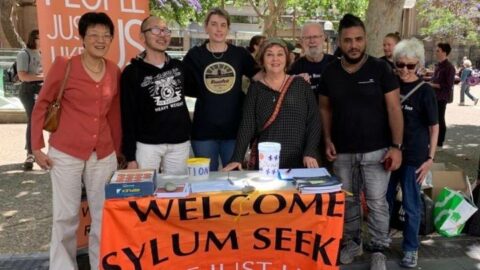
People Just Like Us has presented a two-point process that it recommends the Albanese government takes in its approach to the refugee situation. What does that involve?
Well, there are people suffering now, right now, and they have been suffering for a long time. We have step one and step two.
For step one, we propose that the Labor government clears the backlog, and that they extend permanent visas to other cohorts who have been suffering for many years – almost a decade in some cases.
These cohorts involve certain people on bridging visas who need permanent safety. It’s around 10,000 people. These are people are in the same situation as the Nadesalingam family and the Medevac cohort. That’s in Australia.
Then there are the two very small cohorts that remain dumped in PNG, where there is about 125, and in Nauru, where there’s about 128.
They’ve been there for a very long time and they’re still suffering. They were trapped there by the Australian government. We need to bring them here and settle them.
Then there is the other cohort that people don’t like to acknowledge. They are the people living on the streets in Indonesia, suiciding and desperate. They’re not allowed to work. They’re not allowed to study.
There are about 13,700 of them. The government have paid to incarcerate them. They have paid through IOM to warehouse them in Indonesia.
It is a festering sore. If you think the Solomon Islands was a festering sore, this one is a ticking problem.
Let’s just demonstrate to our neighbours that we are part of the region and prepared to do the heavy lifting.
These numbers, these cohorts added up, are a tiny fraction of the 190,000 annual migrant intake recommended by economists.
That is step one. Step two is once the caseload backlog is cleared. The whole system can be reset. So, no one lives in Indonesia. No one is in the camps. We’ve done away with the past mess.
Then it’s time to implement a suite of measures such as a generous annual intake, targeting our region with safe passage and an orderly departure program.
They should rescind the border force punitive laws, so that we’re futureproofing our refugee system.
We can also look at implementing the Wilke bills. They’re already before parliament. They’re bills to end indefinite detention, a bill of rights and a regional solution. Those three bills can be looked at by this new parliament and they could implement them.
There are strategic reasons to reset refugee policy, not just compassionate ones. As I said, we’ve seen how that’s important in the Pacific.
So, it’s not strategic to leave 13,700 desperate people dumped on our neighbours’ streets. It’s a festering sore. It’s trouble.
How did these asylum seekers in Indonesia come to be there? And you’re saying the government has already taken some responsibility for them via the paying out of money.
It’s not transparent. We don’t know how much. But we know that for many years, they were incarcerated in detention centres. A secretive network of detention centres in Indonesia. It was never discussed.
If you go onto the Twitter handle #HelpRefugees_Indonesia you will see some of what’s happening.
We say there are very good reasons for dealing with this. Some countries are now looking at the global compact on refugees. It’s being considered by several nations.
If Australia is seen to be a proactive ally in our region, that’s prepared to do its fair share of the heavy lifting, it will put us in a better position with our near northern neighbours and friends in ASEAN and pave the way for the implementation of a regional solution.
We hope that people will take a good look at this proposal and get on board with it.
So, have those people in Indonesia been there since the turnbacks began?
Some of them have been there for almost 10 years. Some of them have been towed back and that’s where they are. Some of them have been blocked from coming here.
Many have family in Australia. As I said, they’re not allowed to work. They’re not allowed to study. They’re becoming absolutely destitute.
And lastly, Fabia, the election wasn’t a straight out win for one of the two majors as is usually the case.
The teal independents knocked out a number of key Coalition players, whilst the Greens have taken balance of power in the Senate.
Are you hopeful that the change in the makeup of parliament will bode well for refugee and asylum seeker rights?
We are very hopeful. It’s the best dynamic we’ve seen in over 20 years in terms of breaking the bipartisan impasse on refugees that has ruined the lives of so many.
It’s a chance to look at the solutions and get rid of the obsessive punishment of people seeking safety.
So, we’re really hopeful that this will end this terrible policy. It’s a failed policy. It’s just a toy of Australian politicians. It’s not really about solutions going forward.
We can’t say what’s going to happen. But we wish the independents and Greens well and we will be in touch with them. We know that each and every one of them punch above their weight.
The independents represent the change that Australians have voted for, and we have certain ones that we’d like to thank.
Andrew Wilkie for having been a stellar champion of human rights and refugees through many dark years.
We’re encouraged that Zali Steggall has seconded the Wilkie bill to end indefinite detention. And we’ve also been impressed by the pro-refugee position taken by successive independent members for Indi and by previous independent Dr Kerryn Phelps.
We look forward to other independents being supportive of the rights of boat arrivals seeking asylum.
We have a lot of hope for the Greens in trying to vote in change. Back when we started our campaigning, we knew of kids being locked up and people being deported to danger.
We naively thought that once Australians realised this was happening, it would be over in six months. And that was almost 25 years ago.
But the Greens have been our singular steadfast supporters for decades, going back to the time that many refugee supporters left Labor and became Tamper Greens. The Labor party has to take a look at that.
We thank the Greens for being there, and we have confidence that they will do all they can in their power to relieve the suffering of thousands of human beings and to win their human rights for them.
We are grateful to Nick McKim, David Shoebridge, Mehreen Faruqi and others for their capable and steadfast support through such a long dark era that has seen many of us grow old on the campaign trail.
We are ready to keep fighting for the rights of people who have become our friends over the years.
It would be wonderful if we could retire in peace and confidence knowing that the rights of refugees are secure, and that the system is futureproofed by the end of this parliament.
